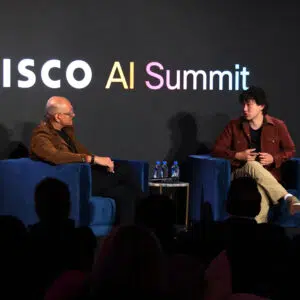

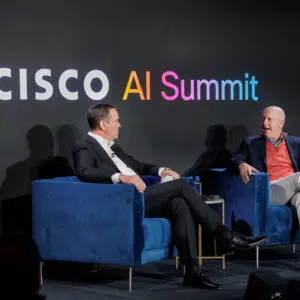
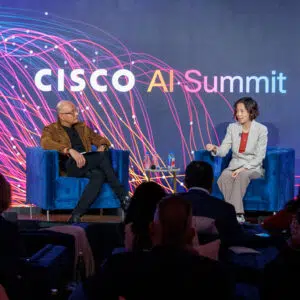
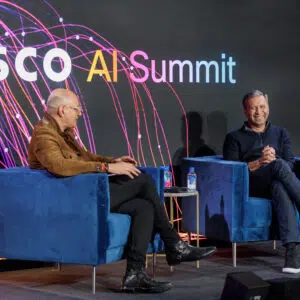
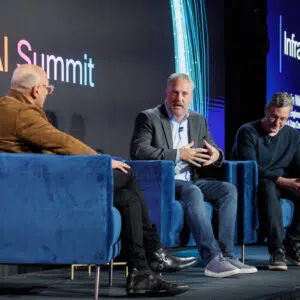
AI is no longer a distant future—it’s here, reshaping industries at a pace we never anticipated. Last month, an exclusive group of the world’s most influential leaders in AI, business, and academia gathered at the Cisco AI Summit to explore the opportunities, challenges, and future implications of this transformation. CEOs and executives from Cisco, Goldman Sachs, OpenAI, Box, Scale AI, Groq, Glean, and more took the stage to share insights on how AI is revolutionizing industries, securing enterprises, and redefining the way we work.
With so many groundbreaking discussions, distilling the key takeaways was no easy feat. But eight insights stood out, offering a compelling glimpse into how AI is reshaping business, technology, and society in ways we’re only beginning to understand.
Key takeaways and insights.
1. Data-driven AI will reshape entire industries.
Alexandr Wang, CEO of Scale AI, provided an insightful exploration of how data-driven AI is revolutionizing industries across the board. “Data is the new oil, and AI is the engine that drives innovation,” Wang emphasized, highlighting the critical role of high-quality data in enhancing AI capabilities. He shared examples of how AI is being leveraged to streamline operations, improve accuracy, and drive decision-making in sectors such as logistics and healthcare.
Looking to the future, Wang envisions a world where AI not only processes data with unprecedented speed and accuracy but also predicts trends and provides strategic insights that redefine industry standards.
2. AI’s role in human well-being is bigger than we think.
Arianna Huffington, Founder and CEO of Thrive Global, offered a compelling perspective on how AI can be harnessed to improve well-being and work-life balance. “In the rush to innovate, we must not forget the human element,” Huffington stated, emphasizing the importance of integrating AI in ways that support mental health and productivity. She shared examples of AI-driven tools that help monitor stress levels, promote mindfulness, and encourage healthier work habits.
Huffington views AI not just as a technological advancement but as a partner in fostering a more balanced, fulfilling human experience. Her insights invite us to consider how AI can contribute to a world where technology enhances, rather than detracts from, our well-being.
3. AI models are evolving beyond human intelligence.
Aidan Gomez, CEO of Cohere, took a thought-provoking look at how AI has evolved from simple language processing to something much more sophisticated—think math, physics, and beyond. “We’re starting to see today those foundational components start to emerge,” he said, pointing to how quickly AI is advancing. Gomez highlighted how AI models are now tackling complex scientific problems and automating intricate tasks that were once thought to be exclusive to human intelligence.
For example, AI is now used in advanced research labs to simulate chemical reactions and predict molecular behavior, revolutionizing fields like drug discovery. Looking ahead, Gomez sees a future where AI not only assists scientists in groundbreaking research but also collaborates in real time to create solutions that we have yet to imagine.
4. AI is disrupting Capital Markets – and there’s no turning back.
David Solomon, Chairman and CEO of Goldman Sachs, took the stage to explore how AI is fundamentally transforming the financial world. “The ability to make people more productive is hugely powerful,” he noted, highlighting AI’s role in enhancing everything from daily tasks to overarching operational strategies. Solomon emphasized a significant sentiment shift in markets, driven by a more business-friendly regulatory environment that encourages investment and growth. He sees AI not just as a tool for efficiency but as a strategic asset that will redefine financial processes and pioneer new products and services.
Looking ahead, Solomon envisions a financial landscape where AI-driven analytics improve risk assessment and compliance reporting, allowing institutions to operate with greater agility and precision. This transformative potential makes AI an indispensable component of modern finance, offering a compelling attraction for those interested in its strategic role in shaping economic landscapes.
5. In the next generation of robotics, AI will teach machines how to understand the world.
Fei-Fei Li, one of the leading AI researchers at Stanford, captivated the audience with her talk on robotics and the importance of 3D modeling. “In order to really bring robots to the world, they have to have a robust world model,” she explained. For robots to truly integrate into our world, they need to “see” and interact with it in a way that mimics human understanding. This is where AI’s potential to transform robotics really starts to shine.
She sees a future where robots equipped with advanced 3D modeling capabilities become essential partners in industries ranging from healthcare to logistics, performing tasks with precision and adaptability. This vision for robotics offers a fascinating perspective on AI’s potential to revolutionize how machines interact with the world.
6. AI-powered customer experiences will redefine brand loyalty.
Abhay Parasnis, CEO of Typeface, took us on a journey into the world of AI-powered customer experiences. “We’re entering a golden age of creative ideation with AI,” he said, highlighting how businesses are tapping into AI to create hyper-personalized interactions with customers. Whether it’s anticipating needs, customizing content, or tailoring solutions, AI is helping brands not just meet—but exceed—customer expectations. In other words, the future of customer service is about to get a whole lot more… personal.
He predicts that AI will not only meet customer expectations but also anticipate and exceed them, transforming customer service into a proactive, personalized experience. This forward-thinking approach will redefine the relationship between brands and consumers.
7. The AI governance era is here – and it’s the new competitive advantage.
Navrina Singh, CEO of Credo AI, made a compelling case for why AI governance is no longer optional. “AI governance is not just a regulatory necessity; it’s a strategic advantage,” she explained. As AI becomes an increasingly integral part of enterprise operations, it is crucial to ensure it is developed and deployed responsibly. For businesses looking to stay ahead of the curve, focusing on ethical AI practices and transparent governance isn’t just about ticking boxes—it’s about building trust and ensuring long-term success.
She foresees a future where responsible AI development becomes a benchmark for success, leading to more ethical and sustainable business practices. This focus on governance highlights the critical role of ethics in the technological evolution of AI.
AI Security isn’t optional – it’s the foundation of the future.
Kevin Wollenweber and Will Etherington from Cisco explored what it takes to build the kind of infrastructure that can support AI at scale. Of course, security was front and center. Wollenweber made a powerful point: “Security is going to be a completely different world when it comes to AI infrastructure.”
Wollenweber and Etherington envision AI infrastructure as a robust framework that supports AI’s vast capabilities and ensures its secure deployment across industries. This forward-looking approach is crucial for businesses ready to harness AI’s full potential while safeguarding their operations.
As AI grows more advanced, ensuring its security becomes even more crucial—and Cisco is already paving the way for secure, scalable solutions. At the summit, Cisco unveiled AI Defense, a cutting-edge solution that promises to take AI security to new heights. With a launch slated for early 2025, this new technology is poised to set new standards for safeguarding AI networks—a critical development as we move into a future where AI is everywhere.
What’s next?
The Cisco AI Summit left everyone buzzing with excitement about AI’s future. Participants walked away with a clear sense that technology is on the verge of transforming how we do business and the world in general. But this isn’t just about what AI can do today; it’s about what’s coming next. As AI continues to evolve, its integration into different sectors will create new opportunities and help solve challenges we haven’t even dreamed of yet.
In the end, the summit didn’t just highlight the power of AI—it showcased how we’re just scratching the surface of what’s possible. The future of AI is bright, and it’s only getting brighter.
Curious about the future of AI? There’s still time to tune in! Watch the AI Summit on demand to hear from top industry leaders and see how AI is revolutionizing the way we live and work.
Source link




No Comment! Be the first one.